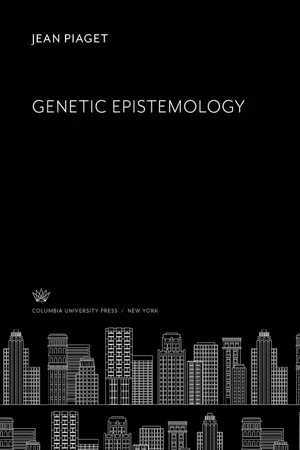
- 84 pages
- English
- PDF
- Available on iOS & Android
eBook - PDF
Genetic Epistemology
Tools to learn more effectively

Saving Books

Keyword Search

Annotating Text

Listen to it instead
Information
Conclusion
T
X
HESE
few
examples
may
clarify
why
I
consider
the
main
problem
of
genetic
epistemology
to
be
the
explanation
of
the
construction
of
novelties
in
the
development
of
knowl-
edge.
From
the
empiricist
point
of
view,
a
"discovery"
is
new
for
the
person
who
makes
it,
but
what
is
discovered
was
already
in
existence
in
external
reality
and
there
is
there-
fore
no
construction
of
new
realities.
The
nativist
or
apriorist
maintains
that
the
forms
of
knowledge
are
predetermined
inside
the
subject
and
thus
again,
strictly
speaking,
there
can
be
no
novelty.
By
contrast,
for
the
genetic
epistemolo-
gist,
knowledge
results
from
continuous
construction,
since
in
each
act
of
understanding,
some
degree
of
invention
is
involved;
in
development,
the
passage
from
one
stage
to
the
next
is
always
characterized
by
the
formation
of
new
struc-
tures
which
did
not
exist
before,
either
in
the
external
world
or
in
the
subject's
mind.
The
central
problem
of
genetic
77
Table of contents
- 1
- 2
- 3
- 4
- Conclusion
- Index
Frequently asked questions
Yes, you can cancel anytime from the Subscription tab in your account settings on the Perlego website. Your subscription will stay active until the end of your current billing period. Learn how to cancel your subscription
No, books cannot be downloaded as external files, such as PDFs, for use outside of Perlego. However, you can download books within the Perlego app for offline reading on mobile or tablet. Learn how to download books offline
Perlego offers two plans: Essential and Complete
- Essential is ideal for learners and professionals who enjoy exploring a wide range of subjects. Access the Essential Library with 800,000+ trusted titles and best-sellers across business, personal growth, and the humanities. Includes unlimited reading time and Standard Read Aloud voice.
- Complete: Perfect for advanced learners and researchers needing full, unrestricted access. Unlock 1.4M+ books across hundreds of subjects, including academic and specialized titles. The Complete Plan also includes advanced features like Premium Read Aloud and Research Assistant.
We are an online textbook subscription service, where you can get access to an entire online library for less than the price of a single book per month. With over 1 million books across 990+ topics, we’ve got you covered! Learn about our mission
Look out for the read-aloud symbol on your next book to see if you can listen to it. The read-aloud tool reads text aloud for you, highlighting the text as it is being read. You can pause it, speed it up and slow it down. Learn more about Read Aloud
Yes! You can use the Perlego app on both iOS and Android devices to read anytime, anywhere — even offline. Perfect for commutes or when you’re on the go.
Please note we cannot support devices running on iOS 13 and Android 7 or earlier. Learn more about using the app
Please note we cannot support devices running on iOS 13 and Android 7 or earlier. Learn more about using the app
Yes, you can access Genetic Epistemology by Jean Piaget, Eleanor Duckworth in PDF and/or ePUB format, as well as other popular books in Psychology & Developmental Psychology. We have over one million books available in our catalogue for you to explore.